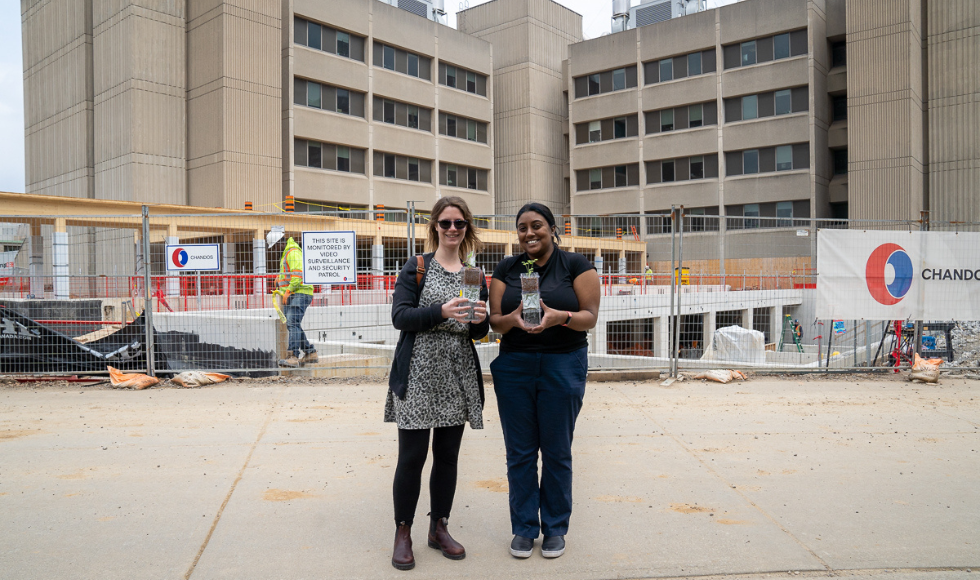New campus greenhouse to nurture research, learning and outreach

Rebecca Batstone, assistant professor of biology, left, and Vanessa Shivnauth, a graduate student in the Batstone Lab, stand at the site of the new McMaster greenhouse in April 2023.
It may look like your average construction site, but something exciting is literally taking root at McMaster University.
A state-of-the-art campus greenhouse is being built beside the Life Sciences Building, with an expected occupancy date of spring 2024.
The project is years in the making, and one that is a source of great excitement among faculty, staff and students in the Department of Biology at the Faculty of Science.
“The new greenhouse will be larger than the current one with many improvements that make it a better place for learning and research,” said Susan Dudley, professor of biology and faculty supervisor of the greenhouse. “The design balances the varied usages of the building with custom-designed spaces. Of course, our plants will be happier there, too.”
The 11,400 sq. ft. greenhouse will feature a sunken floor offering more space for plants to grow upward. A highlight of the design is climate-controlled spaces, with dedicated research and learning areas.
Sails just under the roof will help biologists customize light, and watering will be automated, further supporting ideal research conditions for the thousands of plants encompassing more than 200 species.

The greenhouse will also be the first building on campus to use a sustainable geothermal system for heating and cooling.
Elizabeth Weretilnyk, professor of biology, worked closely with Dudley, members of the Department of Biology and McMaster’s facilities team to ensure the building had everything needed. She said that among the top priorities was the ability to control temperature.
“When it comes to experiments, you need to have controls around temperature regardless of whether it is summer or winter,” Weretilnyk said.
“We also benefit by having the new greenhouse located beside the Life Sciences Building when it comes to plant transportation as our undergraduate and graduate students conduct research year-round and they don’t have to worry about plants freezing between buildings. The new greenhouse is truly a game changer.”
The impact of adding a custom-built greenhouse at McMaster is already evident.
Rebecca Batstone joined the Faculty of Science in July 2022 as an assistant professor of biology. Her research combines experimental evolution with various genomic techniques to study how mutualistic microbes adapt to hosts, to understand how changing abiotic conditions modulate such adaptation, and to identify the genomic mechanisms underlying symbiosis evolution.
She says McMaster’s new greenhouse project caught her attention and was an important consideration when selecting an academic institution to launch her research program.
“This greenhouse is above and beyond what I would have expected a university to have,” Batstone said. “In terms of my work, it’s really important to have research cells where I don’t have to worry about contamination with a neighbouring cell that has another pathogen, and I can control the growing conditions. That is exciting to me and at the top of my list of what I’m looking for when it comes to my research.”
Vanessa Shivnauth, a graduate student in biology who is a member of the Batstone Lab, is investigating the relationship between biofilms, plant and soil health, and rhizobial bacteria. The new greenhouse will be home to her research.
“I am excited for the new greenhouse — a brand new environment to work in that actually gives me enough space to grow plants at an agriculturally-relevant scale,” said Shivnauth.

Another anticipated outcome of the new and improved campus greenhouse is increased community engagement.
The existing aging greenhouse next to Hamilton Hall welcomes upwards of 3,000 visitors each year. Students and community members can regularly be found in the space, both as visitors and as volunteers. Other guests include children attending McMaster camps, patients and their families at the hospital on campus, visiting school tours, and even staff groups participating in wellness events.
The number of annual visitors to the new greenhouse is expected to blossom thanks to the building’s new location near the hospital and at the heart of campus, its accessible design and improved visitor experience due to its stunning architecture. There are already preliminary discussions about additional programming, such as yoga, that could be held in the space.
Marie Elliot, department chair and professor of biology, says the building will benefit the campus community and public in every way imaginable.
“The new greenhouse will provide our students and our faculty members with a state-of-the-art facility in which to explore critical questions relating to plant survival in the face of adverse conditions, plant immunity, and plant communication, in addition to understanding how plants and microbes can collaborate to improve plant growth and minimize the use of fertilizers and pesticides,” said Elliot.
“Plant biology is something that impacts everyone – plants provide us with food and oxygen, and increasingly, we are learning about the physical, mental and emotional benefits associated with ‘green spaces.’”
The current greenhouse will be retired when the new one is built. Plants from the current building, from the beloved chocolate tree to the odorous but beautiful titan arums, will be carefully relocated to their new home once construction is complete.
The greenhouse welcomes student and community volunteers. To learn more, email Susan Dudley.


